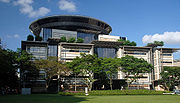| Yong Vui Kong v Public Prosecutor | |
|---|---|
 The Supreme Court of Singapore, photographed in April 2007 | |
| Court | Court of Appeal of Singapore |
| Full case name | Yong Vui Kong v. Public Prosecutor and another matter |
| Decided | 14 May 2010 |
| Citations | [2010] SGCA 20, [2010] 3 S.L.R. 489 |
| Case history | |
| Prior actions | Public Prosecutor v. Yong Vui Kong [2009] SGHC 4, H.C.; Yong Vui Kong v. Public Prosecutor [2009] SGHC 274, H.C.; [2010] 2 S.L.R. 192, C.A. |
| Related actions | Yong Vui Kong v. Attorney-General [2011] SGHC 235, [2011] 1 S.L.R. 1, H.C.; [2011] SGCA 9, [2011] 2 S.L.R. 1189, C.A. |
| Court membership | |
| Judges sitting | Chan Sek Keong C.J., Andrew Phang Boon Leong and V.K. Rajah JJ.A. |
| Case opinions | |
| Mandatory death penalty imposed by the Misuse of Drugs Act (Cap. 185, 2001 Rev. Ed.) for certain drug trafficking offences does not infringe Articles 9(1) and 12(1) of the Constitution of Singapore. | |
This article is written like a personal reflection, personal essay, or argumentative essay that states a Wikipedia editor's personal feelings or presents an original argument about a topic. (November 2022) |
Yong Vui Kong v. Public Prosecutor was a seminal case decided in 2010 by the Court of Appeal of Singapore which, in response to a challenge by Yong Vui Kong, a convicted drug smuggler, held that the mandatory death penalty imposed by the Misuse of Drugs Act (Cap. 185, 2001 Rev. Ed.) ("MDA") for certain drug trafficking offences does not infringe Articles 9(1) and 12(1) of the Constitution of Singapore.
Article 9(1) states: "No person shall be deprived of his life or personal liberty save in accordance with law." The Court of Appeal held that the term law does not exclude laws sanctioning inhuman punishment. This does not mean that all laws are justified whatever their nature. Laws which violate fundamental rules of natural justice, or those that are absurd or arbitrary cannot be considered law. Nonetheless, the threshold of culpability in imposing the mandatory death penalty for drug-related offences is a matter of policy and is therefore a matter for legislation and not for the courts to decide. The Court distinguished a line of Privy Council cases finding the mandatory death penalty to be unconstitutional, because the constitutions of the jurisdictions from which the appeals originated contained an explicit prohibition against inhuman punishment, which Singapore's Constitution lacks. In addition, though the Constitution of India also does not expressly prohibit inhuman punishment, the Court declined to follow a decision of the Supreme Court of India invalidating the mandatory death penalty for inconsistency with Article 21 of the Indian Constitution, which is similar to Singapore's Article 9(1). Among other things, it took the view that the test for constitutional validity under Article 9(1) is different from the test applied to India's Article 21. Finally, the Court was of the opinion that rules of customary international law cannot be incorporated into the meaning of the word law in Article 9(1) as this is not in accordance with the normal hierarchy of Singapore law, which envisages that customary international law may only be adopted into the common law if it is not inconsistent with existing domestic laws. In any case, there is insufficient state practice to demonstrate that customary international law regards the mandatory death penalty as an inhuman punishment.
The Court of Appeal also held that the mandatory death penalty does not violate Article 12(1) of the Constitution, which states: "All persons are equal before the law and entitled to the equal protection of the law." In its opinion, the 15-gram (0.53 oz) differentia used in the MDA to determine whether the death penalty should be imposed for trafficking in diamorphine (heroin) cannot be said to be purely arbitrary, and bears a rational relation to the social object of the Act which is to prevent the growth of drug addiction in Singapore by stamping out the illicit drug trade.
Following this case, the appellant Yong Vui Kong unsuccessfully challenged the process by which the President grants clemency to convicted persons on the advice of the Cabinet. Later, in 2013, his sentence was commuted to life imprisonment in a re-trial after changes to the death penalty laws allowed drug convicts to face a potential life sentence other than death provided they acted as couriers or suffer from mental illnesses.